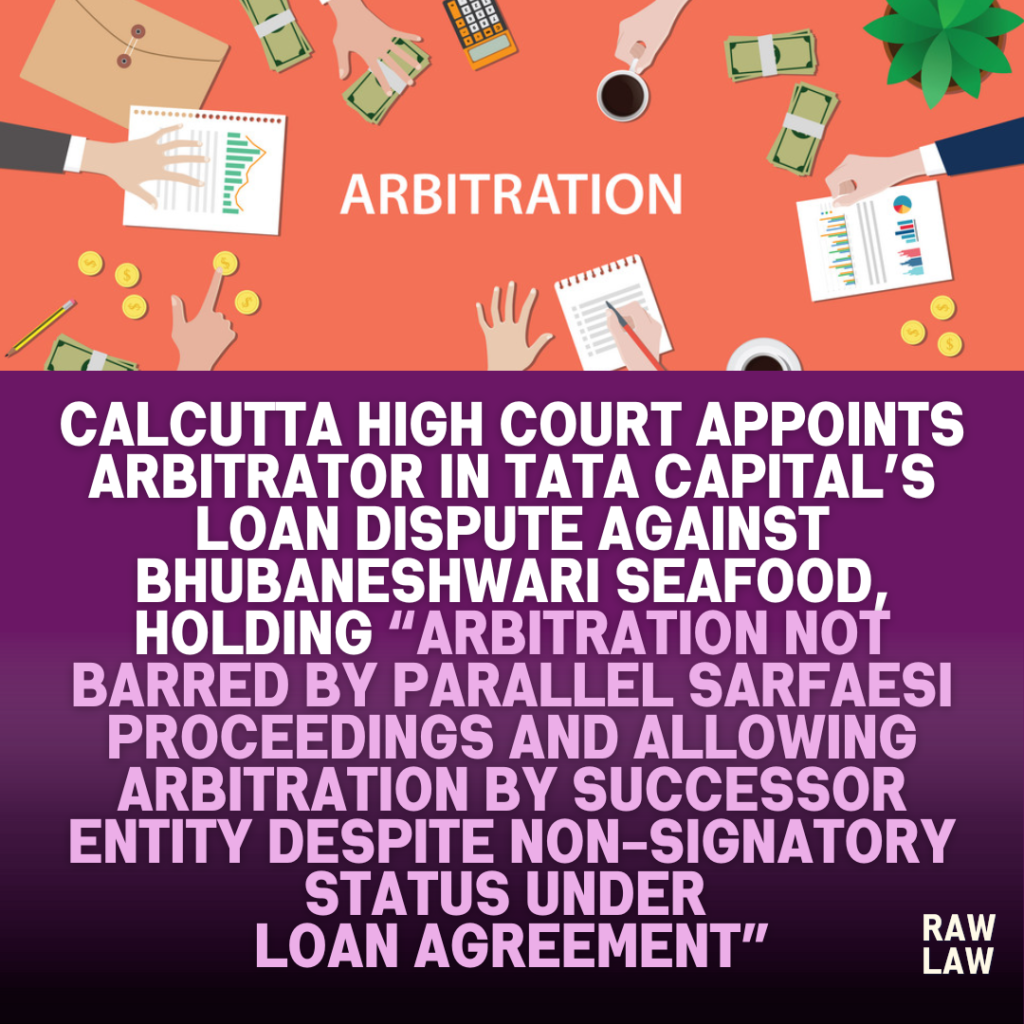Court’s Decision
The Calcutta High Court appointed Ms. Noelle Banerjee, Advocate, as the sole arbitrator to adjudicate disputes between Tata Capital and Bhubaneshwari Seafood regarding loan default, holding that arbitration was maintainable despite SARFAESI proceedings and that Tata Capital, as a successor post-merger, could validly invoke the arbitration clause.
Facts
Tata Capital, a non-banking financial company, sought arbitration under Clause 13 of a term loan agreement dated 27 September 2021, following a default by Bhubaneshwari Seafood. The loan was initially disbursed by Tata Capital Financial Services Ltd., which merged with Tata Capital effective 1 January 2024 pursuant to NCLT orders, transferring all rights, assets, liabilities, and agreements to Tata Capital. Despite a loan recall notice on 11 April 2025 and an arbitration notice on 30 April 2025, no payments were made, prompting Tata Capital to file for appointment of an arbitrator under Section 11.
Issues
- Whether Tata Capital, as a successor entity post-merger, could invoke arbitration despite being a non-signatory to the original agreement.
- Whether proceedings under the SARFAESI Act barred arbitration proceedings under the Arbitration and Conciliation Act.
- Whether disputes under the loan agreement were arbitrable, given the invocation of SARFAESI and the respondent’s objections regarding the Master Terms and Conditions.
Petitioner’s Arguments
The petitioner argued that post-merger, it acquired all rights and liabilities of the erstwhile lender under the loan agreement, including the right to invoke arbitration. It contended that the arbitration clause in Clause 13 of the loan agreement was valid and that the pendency of SARFAESI proceedings did not bar arbitration. It sought the appointment of an arbitrator under the prescribed procedure and emphasized that the arbitration notice was duly served but remained unresponded.
Respondent’s Arguments
The respondents argued that the application was not maintainable, contending that the Master Terms and Conditions referred to in the agreement were not entered into with their consent and thus not binding. They argued that SARFAESI proceedings had already led to the physical possession of mortgaged properties, leaving nothing to be arbitrated and contended that the petitioner had opted for an alternative remedy, which should preclude arbitration to prevent multiplicity of proceedings.
Analysis of the Law
The court relied on:
- Ajay Madhusudan Patel v. Jyotrindra S. Patel (2025) 2 SCC 147 and Cox & Kings Ltd. v. SAP India (2025) 1 SCC 611, which clarified that a non-signatory successor could invoke arbitration if it demonstrated direct and substantial involvement in the contract’s performance, or rights under the contract had devolved upon it by law post-merger.
- Chloro Controls India Pvt. Ltd. v. Severn Trent Water Purification Inc. (2013) 1 SCC 641, confirming that arbitration could be invoked by or against non-signatories in specific circumstances where rights flow under or through the signatory party.
- The court noted the principle that SARFAESI proceedings and arbitration are distinct remedies, and pursuing one does not bar the other.
Precedent Analysis
The judgment applied:
- Ajay Madhusudan Patel and Cox & Kings, emphasizing non-signatory participation and rights post-merger in arbitration.
- Chloro Controls, reinforcing that successors could invoke arbitration.
- The court rejected the argument that SARFAESI proceedings barred arbitration, noting that the scope of SARFAESI proceedings differs from dispute resolution under the Arbitration Act.
Court’s Reasoning
The court found that:
- Tata Capital, as the successor entity, could invoke arbitration under Clause 13, even if it was not an original signatory, as all rights, liabilities, and agreements were transferred post-merger by operation of law.
- The pendency of SARFAESI proceedings did not bar arbitration under the Arbitration and Conciliation Act.
- The disputes under the loan agreement remained arbitrable, and the objections regarding the Master Terms and Conditions were to be decided by the arbitrator.
- The arbitration clause was valid, with parties’ knowledge and acceptance, and the invocation was proper.
Conclusion
The court appointed Ms. Noelle Banerjee as the sole arbitrator, with liberty to fix remuneration under the Arbitration and Conciliation Act. It clarified that it had not decided on merits, only on the prima facie existence of the arbitration clause, and that the arbitrator would address issues of maintainability, jurisdiction, and merits.
Implications
This judgment reinforces:
- Successors post-merger can invoke arbitration even if they were not signatories to the original agreement.
- SARFAESI proceedings do not bar arbitration, ensuring lenders can pursue parallel remedies for recovery.
- Arbitration agreements in loan transactions remain enforceable post-merger, safeguarding financial institutions’ rights while ensuring borrower disputes are adjudicated efficiently.
Short notes on cases referred and their relevance
- Ajay Madhusudan Patel and Cox & Kings: Allow non-signatories with substantial involvement post-merger to invoke arbitration.
- Chloro Controls: Arbitration can proceed between signatories and successors/third parties in defined circumstances.
These cases guided the court’s view that Tata Capital could invoke arbitration post-merger.
FAQs
1. Can a successor company post-merger invoke arbitration if it was not an original signatory?
Yes, if rights and obligations under the agreement have devolved upon it post-merger, it can invoke arbitration under Indian law.
2. Does initiating SARFAESI proceedings bar arbitration in loan disputes?
No, SARFAESI and arbitration are distinct remedies, and arbitration can proceed despite SARFAESI action.
3. What issues can the arbitrator decide in post-merger arbitration disputes?
The arbitrator can decide on the maintainability of arbitration, validity of agreements, jurisdictional objections, and merits of the dispute.
